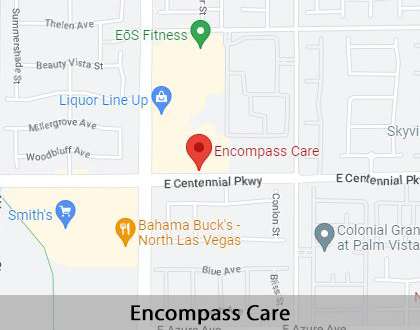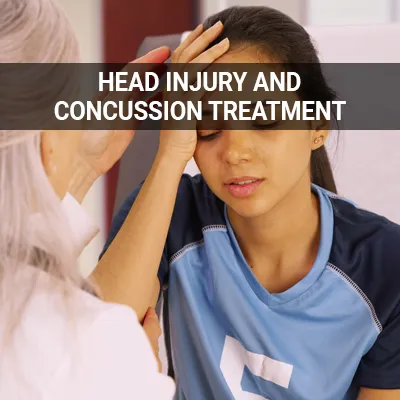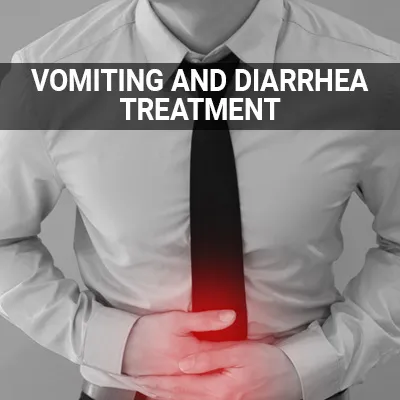Chest and Abdomen Pain Treatment North Las Vegas, NV
It can be difficult to know how severe your chest and abdominal pain is, the cause of the pain, and what treatment you need. It is important to seek medical assistance any time chest or abdominal pain becomes concerning. In most cases, chest and abdominal pain is minor and treatable at home with home remedies and over-the-counter medications. However, more serious chest or abdominal pain could suggest something is wrong.
Being proactive and seeking prompt care can relieve pain and discomfort and prevent further complications from arising. Chest and abdomen pain can be checked at Encompass Care in North Las Vegas and the surrounding area. Our staff can help you determine whether the pain is minor or severe and help you treat it.
Call us at (702) 514-4295 to visit our urgent care center for an evaluation and treatment today.

Chest and Abdominal Pain: What Is Happening
The chest refers to the upper portion of the body between the neck and abdomen; the abdomen is the stomach and home to the digestive organs. Chest pain is pain or discomfort in the chest area that may cause a dull ache, a crushing or burning feeling, a sharp stabbing pain, and pain that radiates to the neck or shoulder. Abdominal pain is pain stemming from the inner abdomen or outer stomach wall that ranges from mild to severe. Abdominal pain can occur in the stomach or surrounding areas.
Facts from Family Circle and Rush
- The pain may not be coming from your heart or even your chest.
- A variety of heart conditions can cause chest pain.
- Some heart attack sufferers do not experience chest pain at all.
- Chest pain may be angina, muscular pain within the heart, and not a heart attack.
- Less than 10 percent of inguinal hernias (by far the most common type) are caused by physically strenuous activity.
- Women are twice as likely to suffer from irritable bowel syndrome.
- The older you get, the more lactose intolerant you may become.
- While it is true that certain foods aggravate ulcers, they do not cause them (in up to 95 percent of cases).
“Chest pain may be angina, muscular pain within the heart, and not a heart attack.”
Causes and Associated Symptoms of Chest Pain
Causes
Chest pain can result from a variety of different causes, ranging from a mild case of heartburn to a heart attack. Due to the wide severity spectrum, it is important to have a clear understanding of what certain chest pain symptoms mean and how to remedy them. While the cause of chest pain may be obvious in some cases, such as a physical injury or sore muscles, it can be difficult to know the exact cause of other forms of chest pain.
The causes of chest pain can be broken into four different categories: heart problems, digestive problems, lung-related issues, or muscle and bone issues. A heart-related issue, such as angina (a condition in which less blood flows to the heart) or a heart attack, are typically the most concerning types of chest pain. Lung-related issues, such as a pulmonary embolism (blood clots in the lung), can be life-threatening as well.
Symptoms
In order to properly assess the cause and severity of your chest pain, it is crucial to know the symptoms and what they mean. The most common symptoms of chest pain include pressure or tightness in the chest, shortness of breath, dizziness or weakness, nausea, and vomiting.
More severe symptoms may suggest a serious heart condition, require urgent care and, possibly, visiting the emergency room. In the event that you begin to experience any of the following symptoms, seek immediate medical assistance: Severe pain that radiates to other parts of the body, especially the arms; Pain that makes it hard to breathe; Moderate pain that lasts for more than a couple of hours. Chest pain can be life-threatening, and it is important to seek medical attention whenever there is a serious concern for any reason.
“Chest pain can result from a variety of different causes, ranging from a mild case of heartburn to a heart attack.”
Treatment for Chest Pain
The form of treatment used to treat chest pain is largely dependent on its cause. In order to determine this, our team of medical professionals will first check to ensure that you are not suffering from a heart attack, pulmonary embolism, or any other life-threatening condition that requires emergency medical attention. After ruling out the most serious concerns, the physician will give a diagnosis based on the current symptoms, a review of your medical history, and in some cases, test results, such as EKG, stress tests, or a CT scan.
Depending on the cause of pain, the physician will likely prescribe one of the following treatment methods:
- Anti-anxiety medication
- Antidepressants
- Antacids
- Blood pressure medication
- Heart medication
- Lung reinflation
- Surgery
We may use medication to improve blood flow to treat chest pain caused by a heart issue. The most common forms of heart medication for chest pain include nitroglycerin, thrombolytic drugs, and blood thinners. If the doctor does not believe the pain is related to a heart issue, they may prescribe another form of pain relief medication to help treat the pain.
If the chest pain is caused by a panic attack or other manifestation of anxiety (e.g., PTSD), we may prescribe anti-anxiety medication in order to ease the symptoms. In the most severe situations in which the chest pain is caused by a serious heart or lung issue, the patient may need surgery.
“We may use medication to improve blood flow to treat chest pain caused by a heart issue.”
Check out what others are saying about our services on Yelp: Chest and Abdomen Pain Treatment in North Las Vegas, NV
Causes and Symptoms of Abdominal Pain
Causes
Abdominal pain typically describes pain occurring between the chest and pelvic region, but it can also radiate to the back. While abdominal pain is often thought of as stomach pain, it is not always caused by a stomach-related issue. Abdominal pain can be attributed to a variety of causes, such as food-related illnesses, an infection that causes nausea, vomiting and diarrhea, or a condition such as kidney stones. There are numerous reasons one may be experiencing abdominal pain. Causes of abdominal pain include, but are not limited to:
- Appendicitis
- Cancer
- Food poisoning
- Gallstones
- Irritable bowel syndrome
- Kidney stones
- Nausea, vomiting and diarrhea
- Stomach flu
- Stomach ulcer
- Stress
- Traumatic injury
- Urinary tract infection
- Viral and bacterial infections
Symptoms
In many instances, abdominal pain may also include pain in several surrounding areas, such as the chest. We need to properly assess the pain level. If the pain is minor and has not persisted for more than a couple of hours, it may resolve or be treatable at home with over-the-counter medications. However, if at any point, the pain progresses to where it is intolerable, be sure to seek urgent care as soon as possible.
The most common symptoms of abdominal pain include:
- Constipation
- Cramps
- Diarrhea
- Nausea
- Pelvic pain
- Severe stomach pain
- Vomiting
“While abdominal pain is often thought of as stomach pain, it is not always caused by a stomach-related issue.”
Questions Answered on This Page
Q. What occurs when the chest or abdomen are causing pain?
Q. What are the causes and symptoms of chest pain?
Q. What types of treatment are there to remedy chest pain?
People Also Ask
Q. What are food poisoning symptoms?
Q. What are the symptoms of concussion?
Q. What can professional treatment do for my respiratory issues?
Treatment for Abdominal Pain
The first thing we do to properly assess and diagnose a patient's abdominal pain is to ask questions about their medical history and the severity of their pain. Additionally, we will conduct an examination, which includes feeling the abdominal region for tenderness and swelling. After doing so, the physician may also obtain labs or imaging, such as an X-ray or ultrasound, to better determine the exact cause. The exact treatment option depends on the severity of abdominal pain and the cause, but most treatments result in medication, lifestyle changes, or surgery.
In some cases, we may prescribe medication to treat the abdominal pain. The exact type of medication depends solely on the cause. For some abdominal pain, over-the-counter medications may relieve constipation or other common symptoms. If a bacterial infection is causing your abdominal pain, we are likely to prescribe antibiotics. In severe cases, a surgical procedure, such as an appendectomy or surgery for severe kidney stones, may be necessary.
Questions to Ask Your Urgent Care Provider
- What should I do if my chest and abdomen pain does not improve after treatment?
- How long will it take me to recover from chest and abdomen pain?
- What is the cause of my chest and abdomen pain? Could I have avoided it?
- How can I make sure I do not develop more chest and abdomen pain in the future?
- What treatment options are available to deal with my chest and abdomen pain?
- Are there any home remedies I can try to ease my chest and abdomen pain?
- Have you treated others with a similar condition? Is my case of chest and abdomen pain normal compared to others?
- What can I do at night to help me sleep better?
- What over-the-counter medications are okay to take? What medications should I avoid?
- Is my chest pain suggestive of anything life-threatening down the road?
- Should I visit a specialist?
- What types of food should I avoid due to my abdomen pain?
“The exact treatment option depends on the severity of abdominal pain and the cause, but most treatments result in medication, lifestyle changes, or surgery.”
Frequently Asked Questions
Q. What is the difference between angina and a heart attack?
A. Angina and heart attacks are somewhat similar, as they both cause chest pain due to the heart. However, angina is a condition in which there is reduced blood flow to the heart that sometimes occurs during exercise. A heart attack, on the other hand, results in a complete, or almost complete, blockage of blood flow to the heart.
Q. I am afraid of having a heart attack and not knowing what to do. How can I notice the signs of a heart attack and what to do in the event of one?
A. One notable symptom of a heart attack besides chest pain is surrounding pain in areas around the heart. A heart attack can result in pain between the shoulders, arms, upper abdomen region, and the chest area. Additionally, an individual suffering from a heart attack is likely to also experience weakness, fatigue, and dizziness. If there is ever a concern that you or someone in close proximity to you is suffering from a heart attack, call 911 immediately.
Q. Is it okay to treat abdominal pain at home if the symptoms are not severe?
A. Yes. In fact, some abdominal pain is minor and does not require medical assistance. However, any time abdominal pain becomes intolerable, lasts for more than several days, or leads to other complications, you should seek immediate medical assistance. In some cases, minor abdominal pain can progress slowly and, if untreated, result in far more serious conditions.
Q. Can food play a part in abdominal pain if I do not have any conditions?
A. Yes, food can have a big impact on both the chest and abdomen. GERD refers to indigestion and gastroesophageal reflux disease, which is commonly called heartburn or acid reflux. This occurs when stomach acid rushes up from your stomach to the chest and throat. It can cause sudden pain or a burning feeling in the chest or abdomen, but usually goes away by itself.
Q. Can stress cause chest or abdominal pain?
A. Yes. Stress affects just about every part of the body and can cause heart attacks, strokes, high blood pressure, anxiety, depression, gallstones, ulcers, and immune functions. Stress can heighten symptoms if you have pre-existing medical conditions. Signs of stress include chest pain and rapid heartbeat, but its symptoms are many.
Start Feeling Better – Visit Us Today
By visiting us as soon as possible, our team can help get you the professional treatment you need. Instead of waiting around and allowing the symptoms to get worse, we can provide you with stronger medication and treatment options instead of ineffective store-bought products.
Definitions
Consult With Us
To ensure your chest or abdominal pain does not grow increasingly worse or last for longer than necessary, consult with us or come in for a visit to our urgent care, especially if your abdominal pain leads to an intolerable amount of pain. If you are concerned about chest or abdomen pain and want to schedule an examination, call us at 702-514-4295.
Helpful Related Links
- American Journal of Medicine. American Journal of Medicine. 2023
- American Medical Association (AMA). American Medical Association (AMA). 2023
- American Medical Society For Sports Medicine (AMSSM). American Medical Society For Sports Medicine. 2023
- American Trauma Society. American Trauma Society. 2023
- John Hopkins Medicine Orthopaedic Surgery. John Hopkins Medicine Orthopaedic Surgery. 2023
- National Council on Aging. National Council on Aging. 2023
- Orthopaedic Surgery: Association of American Medical Colleges. Orthopaedic Surgery: Association of American Medical Colleges. 2023
- Radiological Society of North America. Radiological Society of North America. 2023
About our business, license, and website security
- Encompass Care was established in 1997.
- We accept the following payment methods: American Express, Cash, Discover, MasterCard, and Visa
- We serve patients from the following counties: Clark County
- We serve patients from the following cities: Las Vegas, North Las Vegas, Henderson, Paradise, Spring Valley, Boulder City, and Winchester
- Norton Safe Web. View Details
- Trend Micro Site Safety Center. View Details
Back to top of Chest and Abdomen Pain Treatment










